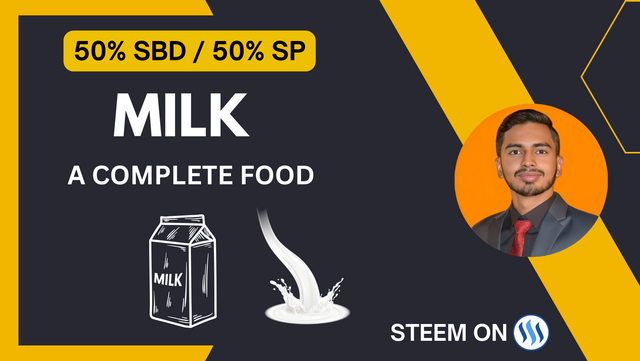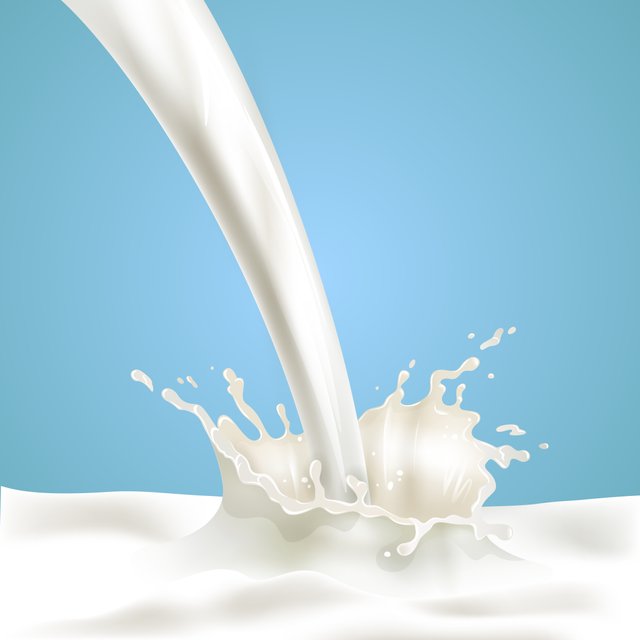
Milk is often referred to as a "complete food," but there are differing opinions on this statement. Both sides (those who agree and those who disagree) have valid points.
Those who say "milk is a complete food" simply argue that milk has all the essential nutrients that our bodies need: carbohydrates, fats, proteins, vitamins, and minerals all packed in it. It is said that milk is a necessary source to assure proper physical and mental development during the growing years of any human being, mainly children and teenagers. It's easily digestible, super convenient—grab and drink while on the go—which is again a very big advantage.
But the other camp disagrees, saying that milk belongs to just one food group, which is dairy products. As for "complete" food, it should contain the nutrients of all major foods—grain, vegetable, fruit, etc. Depending entirely on milk, whilst it is a nutritious kind, will potentially make you run short of some nutrients provided by other foods and will not be helpful for having a balanced diet.
Personally, I think both views make valid points that are worth considering. Milk is undoubtedly a highly nutritious drink and should definitely be an important part of a healthy, well-rounded diet.
But the critics probably would be right when they point to the fact that you really cannot rely on milk alone to fulfill all your nutritional needs. A diverse diet that incorporates milk along with foods from the other major food groups is likely the ideal way to ensure you're getting all the nutrients your body requires.
Speaking of amazing nutrition packed into milk, let's dive into why it's so darn essential for our overall health and growth, especially during childhood and adolescent years when the body goes through lots of developing phases.
Milk is an excellent source of high-quality proteins like casein and whey, carbohydrates in the form of lactose, healthy fats, and a wide array of essential vitamins and minerals like vitamin B12, vitamin A, vitamin D, calcium, phosphorus, and potassium.
And all these different types of nutrients, most importantly, are present in milk in perfectly balanced quantities—not too much of any nutrient and not too little, just right. In a way, it's like nature has designed a perfectly tuned nutritional supplement for them!
Doctors, dieticians and health experts always emphasize the importance of milk consumption because it provides so many fantastic benefits. . Due to the calcium content, there are strong and healthy bones, thus eliminating conditions such as osteoporosis in old age.
The protein is helpful in ensuring constant growth and repair of muscles, especially in active kids who are involved in sports or other physical kinds of activity. Also, milk really maintains metabolism and gives constant energy from food just because of this perfect blend of nutrients.
Now, think what would happen if a child or a teen did not consume enough milk during those vital, early years when growth in the body and brain was at an intense pace. Not really an encouraging view, right? Generally, poor bone health and weak bones that break easier, result from low levels of calcium. No parent wants that for their kid!
Inadequate consumption of these high-quality milk-derived proteins, therefore, means a direct compromise to the proper development of muscle mass and overall growth, leaving the children physically weaker, with possibly stunted height or smaller stature compared to others of their same age. This is especially problematic for youngsters who are very active in sports or other physical pursuits that demand strong musculature.
A low level of the very plentifully available milk vitamin D can also show up as rickets—a condition in which the bones of children soften and deform owing to impaired mineralization and bone metabolism. That is why the experts advise the children to stay a little bit in the sun and have vitamin D, or even milk helps.
So, in essence, failing to consume sufficient milk from an early age onward really does open the door for a whole host of troubling nutritional deficiencies that can have lasting detrimental impacts on a child's physical growth, muscle and bone development, and even their cognitive abilities. It's absolutely crucial to incorporate milk as a staple part of any kid's or teenager's diet to ensure they're getting all those vital nutrients their developing bodies and brains require.
One must consider milk as a staple part included in any kid's or teenager's diet, for it is one sure source of meeting the demands of those vital nutrients that their growing body and brains need. But I know some people have issues properly digesting the lactose, which is the natural sugar present in milk and dairy products.

If you suspect you might have some degree of lactose intolerance, you'll want to look out for symptoms like excessive gas formation, abdominal pain or cramps, diarrhea, nausea or vomiting that tends to occur within 30 minutes to 2 hours after consuming milk or dairy products. These gastrointestinal issues happen because your body isn't producing enough of the lactase enzyme required to fully digest and break down that lactose sugar.
If lactose intolerance seems likely based on those kinds of symptoms, there are medical tests that can confirm it. One is a simple blood test that measures the levels of lactase enzyme in your body. Another is known as a hydrogen breath test, where you'll drink a lactose-loaded beverage and then breathe into a balloon-like bag periodically - if your breath shows high levels of hydrogen gas, that's a strong indicator of undigested lactose fermentation occurring in the gut.
The only solution for people diagnosed as lactose intolerant is to avoid the intake of regular milk and its dairy products, since it contains lactose. But, totally cutting out dairy might not be a good idea, as milk is a great source of so many valuable nutrients that are hard to replace with something else. Now, luckily, many companies produce milk, yogurt, cheese, and other derivatives with added lactase enzyme during the processing stage, so it has already broken down that pesky lactose.
On the other hand, apart from the dairy products of lactose-free preparations, the individual may turn to several other non-dairy, plant-based substitutes that could be from almond milk, soy milk, or even oat milk, among others. This is, of course, lactose-free and often supplemented with calcium, vitamins, and plant proteins to reflect the nutrient profile found in regular cow's milk. Do read the label, however, as the different plant milks have varying amounts of added nutrients.
For anyone dealing with lactose issues, it's a good idea to consult your doctor or a qualified nutritionist or dietician. They can provide personalized guidance on appropriate milk/dairy substitutes and suggest other calcium-rich, protein-packed foods to include in your diet. That way you aren't missing out on all the essential nutrients milk provides just because you struggle to digest the lactose part.




"Steem Kids & Parents" never disappoints. Thank you for the booming support, even though I was not among the winners. 😊
Cc: @ngoenyi
Downvoting a post can decrease pending rewards and make it less visible. Common reasons:
Submit
😘🤗
Downvoting a post can decrease pending rewards and make it less visible. Common reasons:
Submit